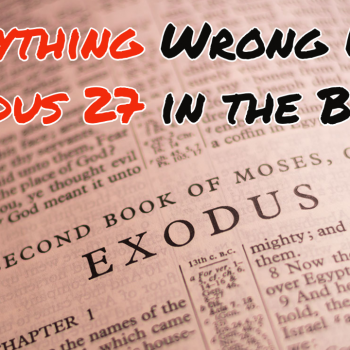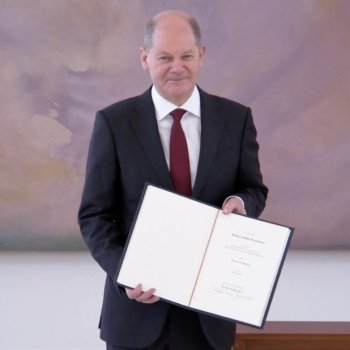Yesterday, the Supreme Court heard a case involving religious freedom and church/state separation, and all signs point to a further erosion of the wall of separation.
Here’s the backstory in case you missed it: Students in Maine are guaranteed free public education until they graduate high school. But in some rural parts of the state, where there are no local schools, students have the option of attending a private school on the state’s dime (assuming they’re accepted into those schools). State law, however, mandates that those schools must be secular. Taxpayer money can’t be used to pay tuition at a religious school. Makes perfect sense.
But a few years ago, three sets of families represented by the (Libertarian) Institute for Justice and the (conservative) First Liberty Institute sued the state claiming it was illegal for Maine to deny funding to the Christian schools the students wanted to attend. Their schools met every condition laid out by the state for a tuition reimbursement… except for the religion part. (Amy and Dave Carson are two of the parents involved in the lawsuit, and Maine’s Commissioner of Education is Pender Makin, so the case is called Carson v. Makin.)

The Christians lost an earlier version of this case, but in 2020, the Supreme Court threw them an unexpected lifeline. The conservative majority decided a case called Espinoza v. Montana Department of Revenue in which they decided that taxpayer funding could subsidize private religious education. If states offered funding for private schools at all, the justices ruled, they may also have to extend that offer to private religious schools. (It depended on the kind of funding program the state offered.)
With that in mind, the conservatives sued again… and lost. Then they appealed… and lost. In fact, the U.S. First District Court of Appeals didn’t buy their argument at all. They said the schools those families wanted to attend discriminated against LGBTQ people and required teachers to accept Jesus. One school even made employees sign a statement saying “God recognize[s] homosexuals and other deviants as perverted.” In other words, these weren’t just regular schools that happened to be run by churches; these were schools that existed to promote a certain ideology. One of the judges even said the Maine program was acceptable because it only denied subsidies if the school’s educational program was explicitly religious. Judge David Barron wrote, “Sectarian schools are denied funds not because of who they are but because of what they would do with the money — use it to further the religious purposes of inculcation and proselytization.”
The conservatives didn’t care about those arguments. They asked the U.S. Supreme Court to overrule the decision, and the Supreme Court, with its conservative super-majority, took it up. There now existed a possibility that a decision favorable to the Christian schools could apply to other states, too, not just Maine.
Atheist and church/state separation groups urged the Court to uphold the earlier rulings for a variety of reasons:
- Overturning Maine’s law would violate established legal precedent.
- Nothing in the Constitution requires public funding for religious education.
- Maine’s tuition program is already neutral toward religion.
- The arguments for overturning the law “endorse a longstanding hostility toward atheistic belief systems.”
- The revised conception of free exercise being promoted here would harm atheist families.
- The First Amendment ensures “that taxpayers are not compelled to subsidize religious teaching or worship.”
- The Constitution’s “no aid” principle is meant to prevent government entanglement with religious education and the taxpayer-funded oversight that would be necessary if we gave religious schools public money.
In other words, there were a lot of arguments that could be made in favor of upholding the earlier decisions.
But when the case was heard yesterday morning, all signs pointed to a decision in favor of the Christian families. Vox’s Ian Millhiser summarized the right-wing justices’ positions:
Chief Justice John Roberts, for example, proposed a hypothetical involving two private schools. One of these schools teaches its religious beliefs openly and explicitly, and it also teaches a particular set of religious values in the process. The other school might eschew explicit references to God or to a holy text, but it teaches a different value system that is motivated by religious beliefs. If the state funds the latter school but not the former one, Roberts asked, why is it not drawing “distinctions based on doctrine”?
Justice Samuel Alito, meanwhile, offered the Fox News version of Roberts’s argument. Maine’s law, Alito noted, does not contain explicit exemptions for private schools that teach white supremacy or critical race theory, but it does explicitly exempt religious schools from its tuition program. The implication was that Maine is discriminating against religion and in favor of critical race theory.
Justice Brett Kavanaugh, meanwhile, offered the most direct version of this argument that neutrality toward religion is the same thing as discrimination. “Discriminating against all religions” is still unlawful discrimination, Kavanaugh told [attorney Christopher] Taub — a position that is difficult to square with the text of the First Amendment, which prohibits laws “respecting an establishment of religion.”
When even the slightly-less-extreme right-wing justices are finding ways to defend the religious schools, the writing is on the wall. It’s just a matter of how many states would be affected by such a ruling. One silver lining, however, is that there is a way to just toss out this case altogether since the religious schools in question may not want to receive any government money at all. If the Supreme Court’s ruling wouldn’t even fix the problem raised by the plaintiffs, then there’s good reason to just dismiss it entirely.
Concerned experts aren’t counting on that out, though. Law professor Caroline Mala Corbin wrote for NBC News:
… Again and again the conservative justices Wednesday returned to the idea that paying for private secular schools but not private religious schools amounted to invidious discrimination against religion, as though Maine had no right to choose to support secular education only. Indeed, based on the comments of many justices during the hearing, it seems the Supreme Court may well eliminate the distinction between religious use and status.
Americans United for Separation of Church and State President and CEO Rachel Laser was similarly worried:
“Today’s oral arguments in Carson v. Makin revealed that the Court’s conservative justices may be poised to turn America’s foundational principle of religious freedom on its head. That principle has never been understood as requiring the government to fund religious education, but several justices seem prepared to reinterpret it to mandate exactly that. The same justices also seemed to ignore the hypocrisy of calling Maine’s program discriminatory for requiring religious neutrality, while at the same time forcing the state to fund private religious schools that discriminate against LGBTQ, non-Christian, and other students, families, and employees.
…
“One of the core reasons our country’s founders enshrined church-state separation in the Constitution was to ensure that the government doesn’t force taxpayers to pay for the private religious education of others. If the Supreme Court requires Maine to fund religious instruction, it will be the first time the court mandates that taxpayers must pay for religious activities — shamelessly undermining our country’s founding principles that form the core of our democracy.”
The Freedom From Religion Foundation also predicts a disastrous outcome:
“Based on the questions posed by the justices at oral argument, the Supreme Court appears poised to read the Establishment Clause out of the Constitution entirely,” notes FFRF Associate Counsel Sam Grover. “Some of the justices demonstrated such a complete lack of regard for the separation of church and state that they could not even acknowledge Maine’s legitimate interest in providing students with a secular education.”
The portents from the highest court in the land are troubling.
“It is a defining feature of our secular republic that citizens may not be taxed or tithed to support religion,” FFRF Co-President Annie Laurie Gaylor remarks. “The Trump Court is so extremely tilted that it appears willing to privilege religion at the expense of this foundational principle.”
There’s no good reason for the Supreme Court to overturn Maine’s law. But there’s also no reason to expect the conservative majority on the Court to follow logic or the Constitution. You don’t have to be a legal scholar to understand we’re in the midst of an erosion of the wall between church and state. It’s only a question of how much the wall will crumble.
(Image via Shutterstock. Large portions of this article were published earlier)




It’s Moving Day for the Friendly ..."
It’s Moving Day for the Friendly ..."
It’s Moving Day for the Friendly ..."
It’s Moving Day for the Friendly ..."